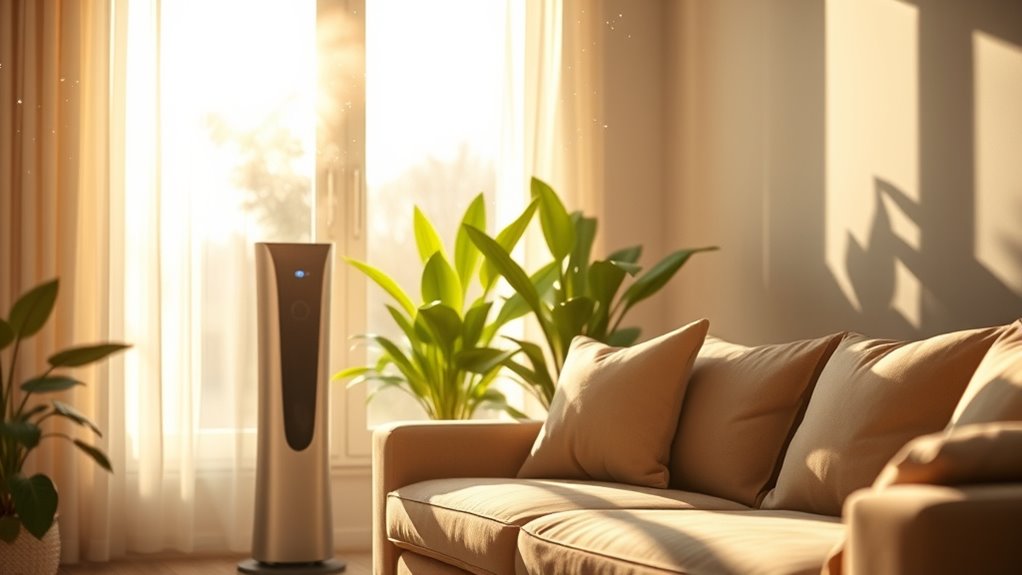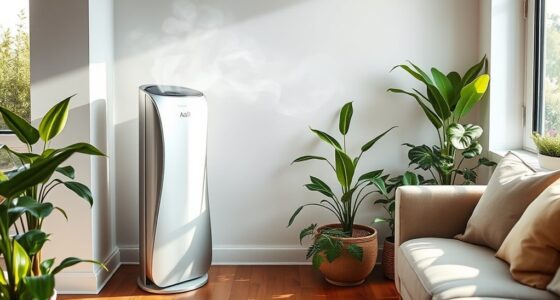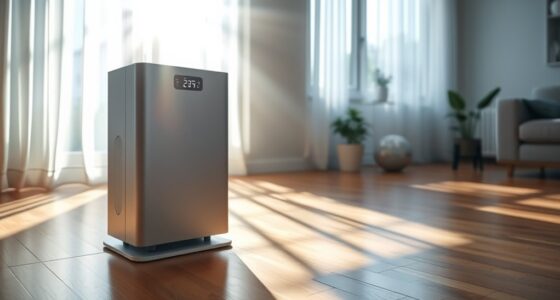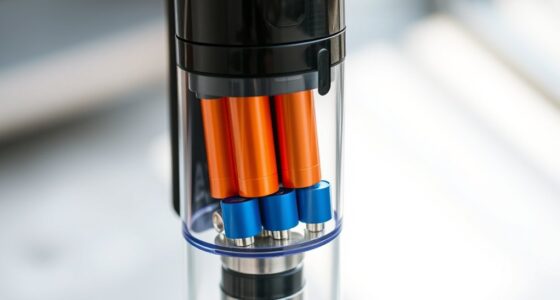Yes, air purifiers can truly save your lungs by filtering out up to 99.97% of harmful pollutants, including dust and pet dander. This leads to cleaner air, which can reduce allergy symptoms and improve respiratory health. They’re especially beneficial for those living in high-pollution areas or for vulnerable groups like children and the elderly. If you’re curious about how specific features enhance their effectiveness, there’s much more to explore!
Key Takeaways
- Air purifiers can significantly reduce allergens and harmful particles, promoting better respiratory health and potentially saving your lungs from damage.
- HEPA filters capture 99.97% of airborne pollutants, effectively lowering levels of fine particulate matter linked to respiratory issues.
- Regular use of air purifiers can alleviate asthma symptoms and reduce allergic reactions in sensitive individuals, especially in polluted environments.
- Vulnerable populations like children and the elderly benefit greatly from cleaner air, improving their lung function and overall well-being.
- While air purifiers help, they should complement other strategies to minimize pollutant sources for maximum effectiveness in lung health.
Understanding Air Purifiers and Their Mechanism
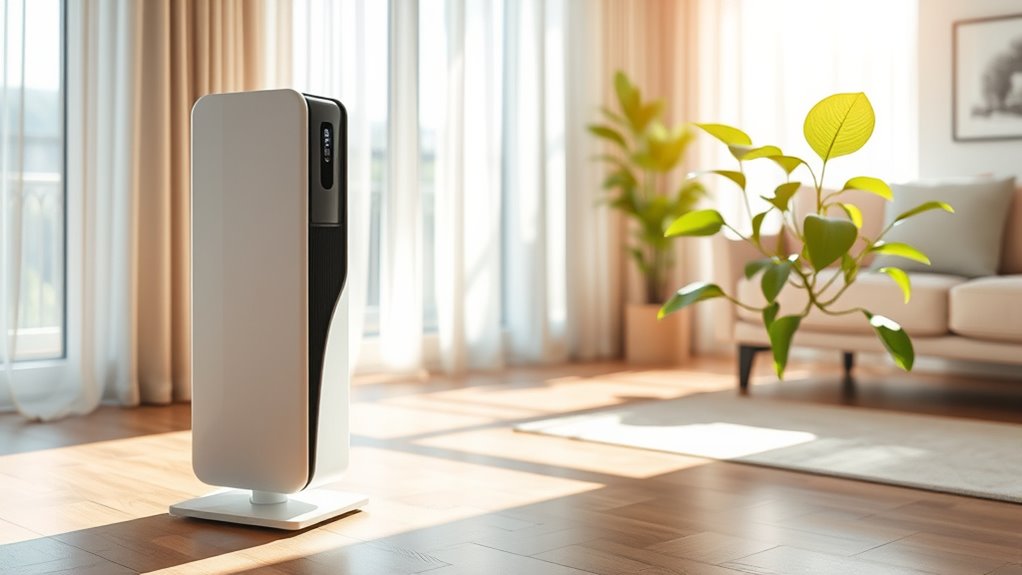
While you might take the air you breathe for granted, indoor air can often be filled with pollutants and allergens that harm your health.
Air purifiers are designed to tackle this issue by filtering and cleaning your indoor air. They draw in contaminated air using fans, passing it through filters like HEPA filters, which capture at least 99.5% of particles that are 3 microns or smaller. Air purifiers can also help reduce the symptoms of asthma and allergies, providing significant health benefits for sensitive individuals. Regular use can lead to improved respiratory health, as studies show that air purifiers can enhance overall well-being. To maintain their effectiveness, it is crucial to regularly check and clean filters to ensure optimal performance. Additionally, consistent maintenance prevents costly repairs and ensures the device functions at its best.
Air purifiers effectively filter indoor air, capturing 99.5% of particles 3 microns or smaller for improved health.
This process effectively reduces airborne pollutants and allergens. The efficiency of air purifiers depends on the type of filter, the Clean Air Delivery Rate (CADR), and how regularly you maintain the device. Additionally, models equipped with UV light technology can further enhance air quality by killing bacteria and viruses.
Whether you choose a portable unit for localized air cleaning or a whole-house system, these devices can greatly enhance the quality of air you breathe at home.
Health Benefits of Using Air Purifiers
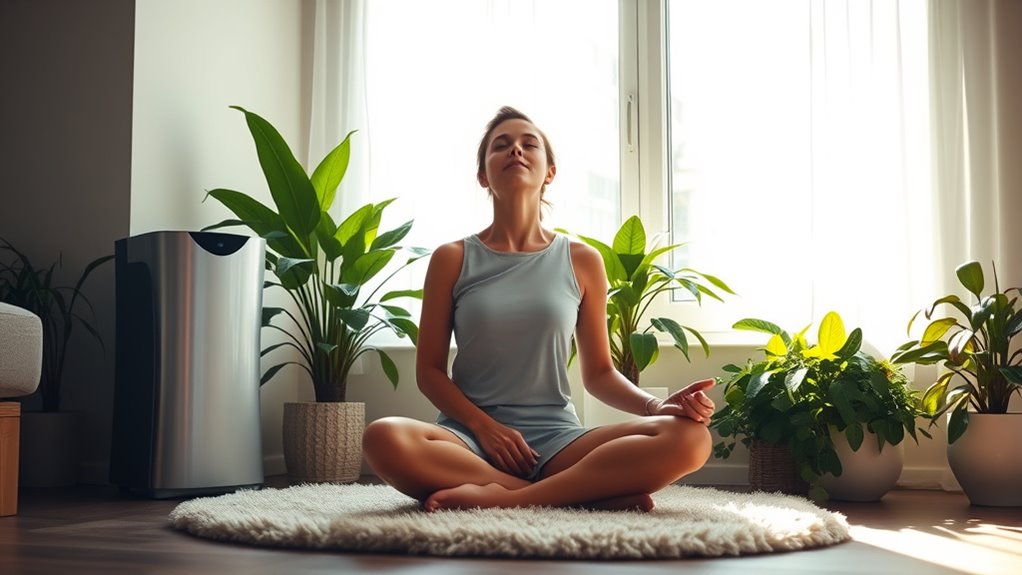
Using air purifiers can greatly boost your respiratory health by filtering out allergens and harmful particles from the air.
You’ll likely notice fewer allergic reactions and an overall improvement in air quality, especially if you live in a polluted area. Additionally, many models utilize HEPA filters to effectively trap these pollutants, ensuring cleaner air in your home. The True HEPA filter technology is recognized for capturing 99.97% of airborne pollutants, making it a critical feature in air purifiers. Furthermore, maintaining essential oil safety is crucial when using diffusers alongside air purifiers, as some oils can be harmful if not used properly. Listening to classical music while using air purifiers can further enhance relaxation and mood, contributing to a healthier living environment. This simple addition to your home can make a big difference in how you feel every day. Additionally, air purifiers can help reduce exposure to harmful airborne pathogens, promoting better overall health.
Improved Respiratory Health
Air purifiers can markedly enhance your respiratory health by effectively removing harmful particles from the air you breathe.
Equipped with HEPA filters, air purifiers can capture at least 99.5% of particulate matter, including dust, pollen, and pet dander, which are known triggers for respiratory issues. Studies show that using air purifiers can lower fine particulate matter levels by up to 57%, leading to improved respiratory health, especially for those with asthma or other serious health conditions. Furthermore, implementing proper planning regarding indoor air quality can maximize the benefits of air purifiers in your home. Additionally, the importance of color accuracy in home cinema projectors parallels the need for clean air, as both significantly enhance overall quality of experience. Maintaining emotional availability in your environment, similar to how clean air contributes to well-being, can further support respiratory health. Regular filter cleaning and replacement are crucial for optimal performance of air purifiers.
Additionally, cleaner air can contribute to better blood pressure levels, hinting at cardiovascular benefits alongside improved lung function.
If you live in high pollution areas or have vulnerable family members, investing in an air purifier could make a significant difference in your overall health. Furthermore, similar to how airless sprayers reduce time and effort in painting tasks, air purifiers can streamline the process of achieving cleaner air in your home.
Reduced Allergic Reactions
When allergens like dust and pollen infiltrate your home, they can trigger uncomfortable allergic reactions. Air purifiers equipped with HEPA filters are designed to tackle these problems by greatly reducing indoor PM 2.5 concentrations, effectively lowering the presence of allergens. This not only helps minimize your allergic reactions but also improves your overall respiratory health. Studies show that air purifiers can alleviate symptoms for individuals with asthma by filtering out common triggers like smoke and pet dander. Furthermore, ensuring that your indoor environment is free from chronic feelings of emptiness can further enhance your well-being and comfort. Regular exercise and cleaner indoor air is especially beneficial for vulnerable groups, including young children and the elderly. Additionally, maintaining a comprehensive business plan can help you assess the impact of air quality on health, guiding better choices for your living environment. By investing in an air purifier, you’re taking a proactive step toward creating a healthier living environment and reducing your allergy-related discomfort. It’s also important to ensure that your home maintains a safe environment for everyone, including newborn safety guidelines to minimize risks associated with allergens and pollutants.
Enhanced Air Quality
Although you might not notice it immediately, the air inside your home can harbor pollutants that greatly impact your health. Air purifiers improve indoor air quality by using HEPA air filters that capture at least 99.5% of particles 3 microns or smaller. This is especially beneficial for those with lung conditions, as cleaner air enhances respiratory function and lowers blood pressure. Studies show air purifiers can reduce fine particulate matter by up to 57%, alleviating allergic symptoms and asthma triggers. With long-term use, you can potentially mitigate serious health issues related to airborne pollutants. Additionally, using air purifiers can create an environment that fosters strong connections with a soulmate, enhancing emotional well-being.
| Benefits | Details |
|---|---|
| Improved Lung Function | Reduces risks of respiratory ailments |
| Alleviated Allergies | Lowers indoor allergen levels |
| Enhanced Heart Health | Lowers blood pressure |
| Cleaner Air | Traps harmful particles and toxins |
Specific Contaminants Air Purifiers Target
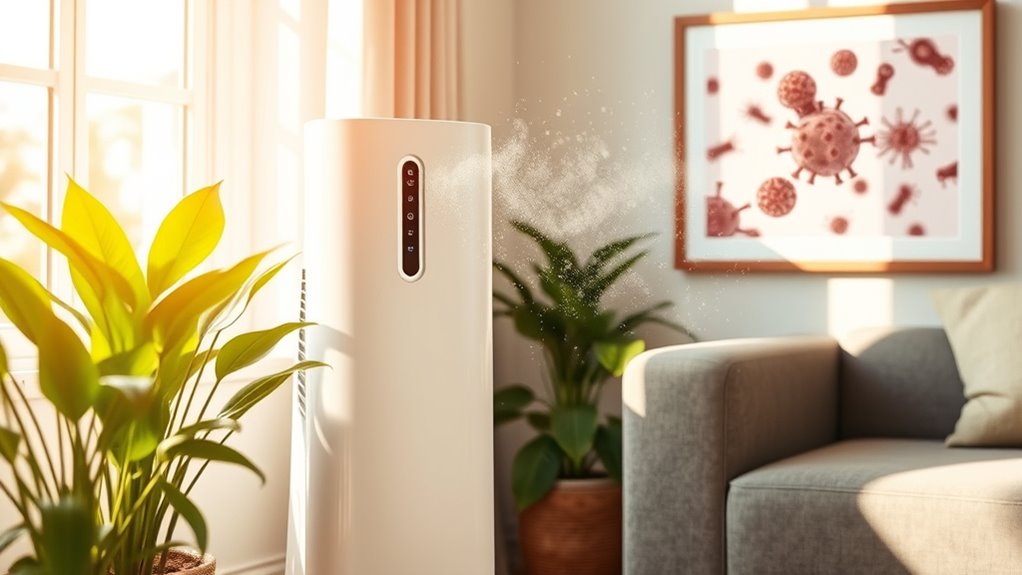
Many people underestimate the variety of contaminants that air purifiers can effectively target. HEPA air filters capture 99.97% of particles in the air as small as 0.3 microns, including allergens like pet dander, dust, and pollen, which can trigger health issues such as asthma and bronchitis.
They’re also effective against wildfire smoke particles, greatly improving air quality in indoor spaces. Personal air purifiers, like the AirTamer 315, use electrostatic purification to repel micron-sized pollutants, though their effectiveness is debated.
Additionally, to tackle gaseous pollutants like volatile organic compounds (VOCs), activated carbon filters are essential, as HEPA filters can’t remove these gases.
Who Benefits Most From Air Purifiers?
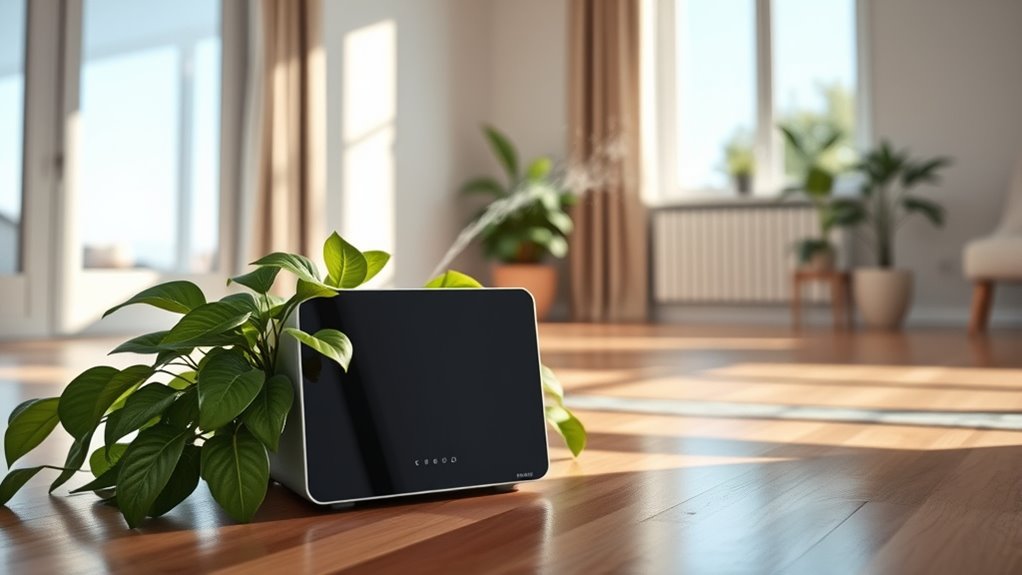
If you live in an area with high air pollution, an air purifier can considerably improve your indoor air quality.
Vulnerable populations, like young children and the elderly, may find that these devices provide relief from respiratory conditions.
Those with pre-existing health issues can also benefit from cleaner air, making air purifiers a valuable addition to their environment.
High Pollution Areas
Living in high pollution areas can pose significant health risks, but using air purifiers offers a practical solution.
These devices can greatly improve air quality by reducing harmful airborne particles and pollutants. In fact, studies show air purifiers can lower fine particulate matter (PM2.5) concentrations by up to 57%.
This is vital for anyone living in polluted neighborhoods, especially those with respiratory issues like asthma or cystic fibrosis. By filtering out common triggers such as dust, smoke, and allergens, air purifiers can lead to better health outcomes.
Consulting with healthcare providers is essential to determine the most effective air purifier options tailored to your specific needs.
Prioritizing clean air can make a meaningful difference in your well-being.
Vulnerable Populations
While everyone can benefit from cleaner air, vulnerable populations see the most significant advantages from air purifiers.
Young children, the elderly, and those with pre-existing heart or lung conditions, like asthma, experience marked improvements in their respiratory health. If you live in an area with high air pollution, air purifiers can drastically reduce harmful airborne particles, enhancing indoor air quality by up to 57%.
Individuals with weakened immune systems also gain from cleaner air, minimizing exposure to allergens and pathogens.
It’s essential for these vulnerable populations to consult with a healthcare provider to assess their specific needs and determine how air purifiers can best support their health and well-being in their living environments.
Respiratory Conditions Relief
Air purifiers play an essential role in alleviating respiratory conditions, especially for those most affected by poor air quality.
If you’re wondering who benefits the most, consider the following:
- Children and the Elderly: Their lungs are often more sensitive to pollutants, making clean air vital for their health.
- Individuals with Pre-existing Conditions: Those with asthma or cystic fibrosis can experience significant relief, as purifiers reduce harmful fine particulate matter.
- Allergy Sufferers: Air purifiers help lower indoor allergen levels, filtering out dust, pollen, and pet dander.
Limitations of Air Purifiers
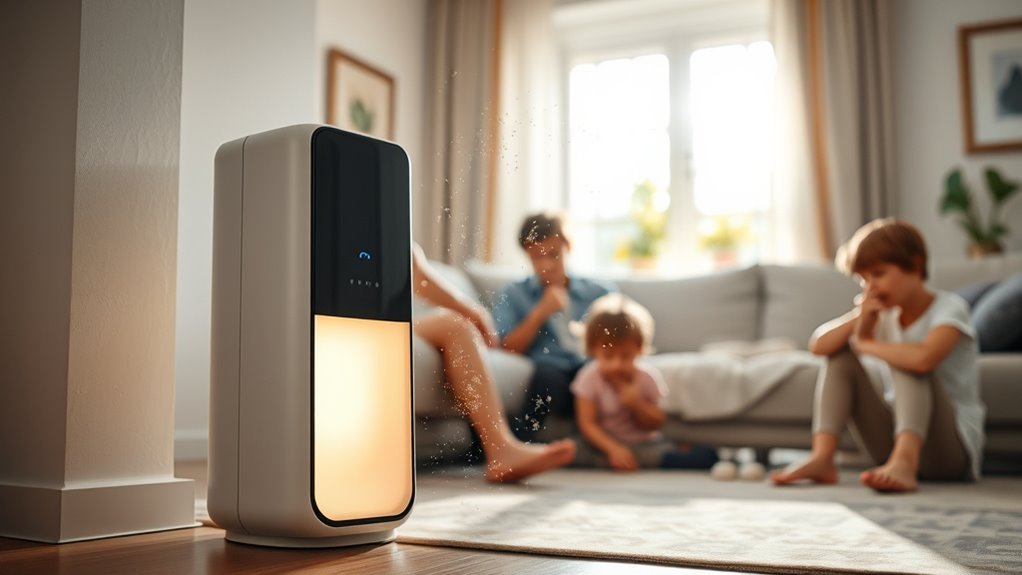
Although air purifiers can markedly improve indoor air quality, they come with notable limitations that you should consider.
For one, they can’t eliminate all pollutants, particularly mold and certain allergens, meaning you’ll still need to maintain cleanliness and manage moisture levels.
Personal air purifiers might emit ozone, which can cause adverse health effects, especially for those with respiratory conditions.
Personal air purifiers may release ozone, posing health risks, particularly for individuals with respiratory issues.
While HEPA filters are excellent for trapping particles as small as 0.3 microns, they don’t address gases and volatile organic compounds (VOCs), requiring additional activated carbon filters.
Furthermore, their efficiency can diminish in larger spaces due to room size and ventilation.
Finally, no long-term studies definitively show that air purifiers reduce serious health issues, so it’s wise to interpret their benefits cautiously.
Air Purifiers vs. Other Air Quality Solutions
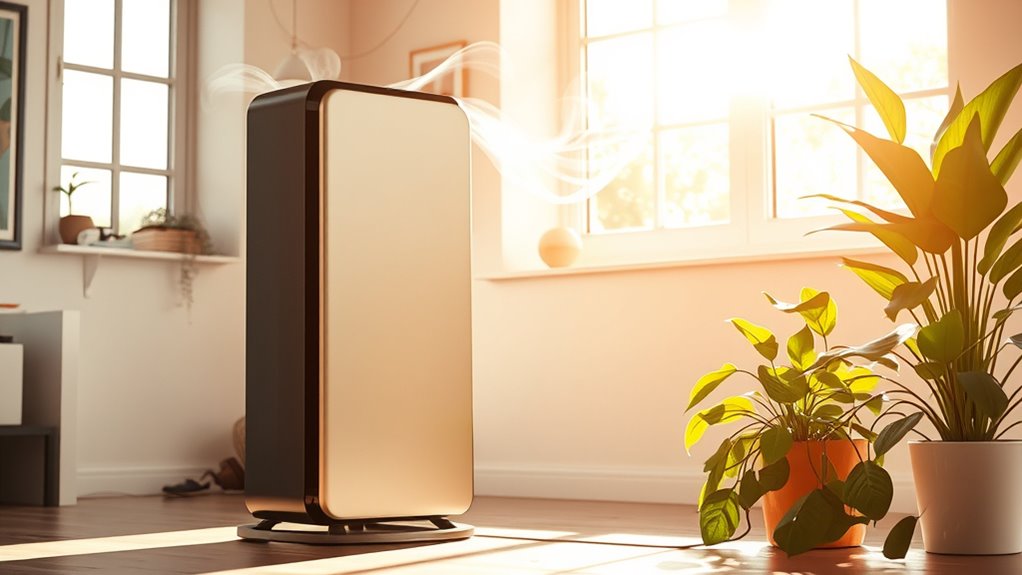
When considering how to improve indoor air quality, air purifiers stand out among various solutions. Here’s why they’re effective against pollutants:
- HEPA Filters: Air purifiers equipped with HEPA filters capture 99.97% of particles, including allergens and viruses, far surpassing options like simply opening windows.
- Whole-House Systems: Unlike personal air purifiers that may emit ozone, whole-house filtration systems are safe and efficient for maintaining indoor air quality.
- Maintenance Matters: Regular filter changes are essential for air purifiers’ effectiveness, while natural ventilation alone mightn’t sufficiently reduce pollutant levels.
While air purifiers play a significant role, they should complement other strategies, like minimizing pollutant sources and enhancing ventilation, for maximum indoor air quality.
The Role of HEPA Filters in Lung Health
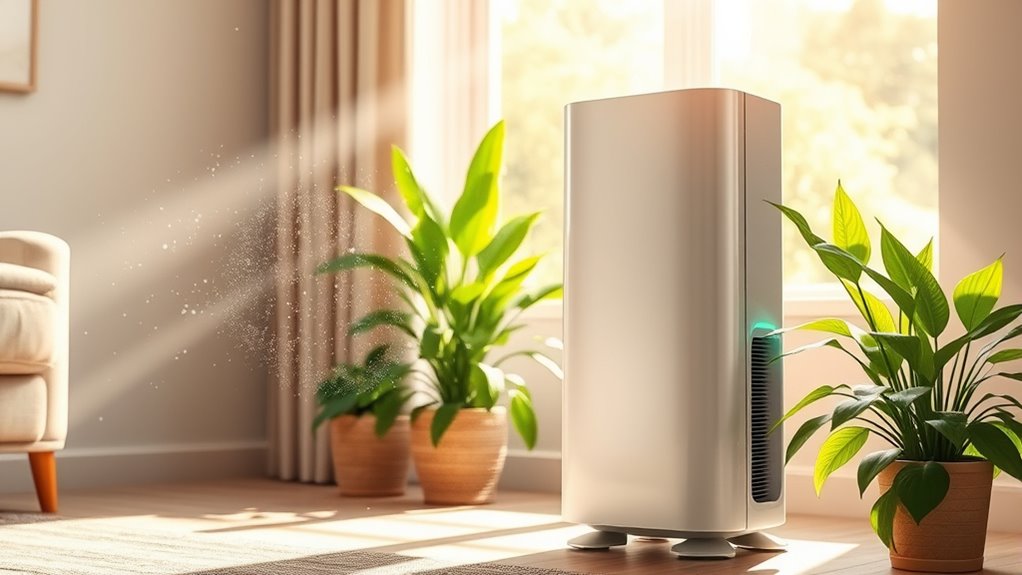
Given the prevalence of indoor pollutants, understanding the role of HEPA filters in lung health is crucial for anyone concerned about air quality. HEPA filters capture at least 99.97% of particles that can harm your lungs, including allergens, dust, and smoke. With cleaner air, you may find relief from asthma and allergies, as these filters markedly reduce indoor PM 2.5 concentrations.
| Benefits | Impact on Health |
|---|---|
| Reduces allergens | Eases asthma symptoms |
| Captures smoke | Lowers respiratory issues |
| Traps viruses | Decreases infection risk |
| Enhances air quality | Supports overall wellness |
| Requires maintenance | Guarantees long-term efficacy |
Investing in HEPA filters can be a crucial step toward protecting your lungs from poor air quality.
Ongoing Research and Future Implications

As researchers explore deeper into the world of air purifiers, they’re uncovering promising findings that could reshape our understanding of indoor air quality and its effects on health.
Ongoing research highlights several key implications:
- Fine Particulate Matter Reduction: Air purifiers can considerably lower fine particulate matter by up to 57%, potentially enhancing respiratory and cardiovascular health.
- Blood Pressure Benefits: Current studies suggest users might experience improved blood pressure levels, hinting at positive heart health effects.
- HEPA Filter Effectiveness: Research shows HEPA filters capture 99.5% of particles, aiding those with respiratory conditions like asthma and cystic fibrosis.
As these findings unfold, experts advocate for more investigation into the health implications of air purifiers, especially their role in combating air pollution and boosting lung health.
Frequently Asked Questions
What Do Pulmonologists Say About Air Purifiers?
Pulmonologists say air purifiers can be beneficial for your respiratory health. They recommend models with HEPA filters, as these can greatly reduce airborne allergens and harmful particles.
You might notice improved lung function, especially if you have asthma or other lung conditions.
However, they caution that air purifiers shouldn’t replace proper ventilation or regular cleaning.
It’s wise to consult your healthcare provider to select the best option for your specific needs.
Do Air Purifiers Improve Lung Health?
Yes, air purifiers can improve your lung health.
When you use an air purifier with a HEPA filter, it captures allergens and pollutants, which can enhance your respiratory function.
Studies show they reduce fine particulate matter, leading to better overall lung function.
If you have conditions like asthma, you might notice significant symptom relief.
However, remember to combine air purifiers with regular cleaning and moisture control for the best results in maintaining healthy air quality.
What Do Doctors Say About Air Purifiers?
Doctors often recommend air purifiers, especially those with HEPA filters, to help reduce allergens and fine particulate matter in your home.
They recognize that these devices can alleviate symptoms for those with respiratory conditions like asthma.
However, they emphasize that air purifiers shouldn’t be your only tool; proper ventilation and reducing indoor pollutants are also essential.
It’s best to consult your healthcare provider to tailor an approach that suits your needs.
Is There a Downside to Air Purifiers?
Did you know that nearly 90% of indoor air can be more polluted than outdoor air?
While air purifiers help reduce indoor pollutants, they aren’t a cure-all. They can’t eliminate all contaminants, and some may even produce ozone, which can irritate your lungs.
Depending on the filter type and your environment, their effectiveness can vary.
Conclusion
In a world where unseen pollutants lurk in every breath you take, air purifiers stand as your silent guardians. Imagine walking into a room where crisp, clean air envelops you, easing the strain on your lungs. As you consider investing in one, remember the potential health benefits and the specific contaminants they tackle. Yet, as you weigh your options, think: can this simple device really transform your indoor air quality and protect your lungs? Only time will tell.
